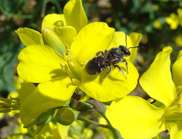Pollinator decline not reducing crop yields just yet

(�鶹��ԺOrg.com) -- The well-documented worldwide decline in the number of bees and other pollinators is not, at this stage, limiting global crop yields, according to the results of an international study published in the latest edition of the respected science journal, Current Biology.
Co-author, CSIRO Entomology’s Dr Saul Cunningham, says however that the study detected warning signs that demand for pollinators is still growing and some highly pollinator-dependant crops are suffering.
“The research team scored crops on how much they depend on pollinators for maximum production,” Dr Cunningham says. “Depending on the crop, this dependence ranges from zero to 100 per cent. For example, cereal crops like wheat don’t need to be pollinated but at the other end of the scale, unpollinated almond trees produce no nuts.”
The team found that between 1961 and 2006 the yields of most crops have consistently grown at about 1.5 per cent a year because of improvements in agriculture. There was also no difference in yield growth between crops that require pollinators and those that do not
“While this is a positive finding, the interaction between yields and pollination is a hugely complex issue which needs to be teased-out further,” Dr Cunningham says. “Global summaries can also hide local stories. In some places, local pollinator shortages are affecting local production. While these don’t threaten overall global food supplies, they can have very significant impacts on local communities and their economies.”
The researchers were surprised to discover that there has been a global increase in the growing of pollinator-dependent crops, particularly in the developing world.
“The fact that, while pollinators are declining in various parts of the world, global agricultural systems are becoming more dependent on pollinators, could create serious problems in the future,” Dr Cunningham says.
When the group looked at pollinated crops in more detail, they found that pollinator shortages might be beginning to affect crops that rely heavily on pollination because their yield growth was lower than for crops that were less dependent.
Dr Cunningham says they now want to examine how declining pollinator supply might be increasing the costs of production. Increased yields are usually the result of increasing farm inputs such as fertiliser, labour and water. For some crops, this increasingly intensive management may have, for now, overcome any losses in pollinator service, but it also increases production costs. There is also evidence that one response to lower yield growth for highly pollinator dependent crops is a growing demand for land.
Citation: Aizen Marcelo A, Garibaldi Lucas A, Cunningham, Saul A & Klein Alexandra M. (2008) Long-Term Global Trends in Crop Yield and Production Reveal No Current Pollination Shortage but Increasing Pollinator Dependency. Current Biology 18: 1-4.
Provided by CSIRO















